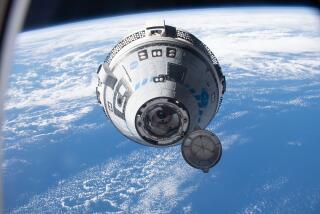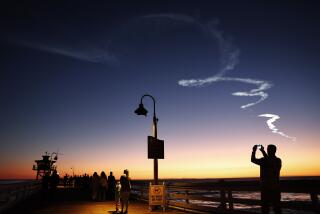Sunny California welcomes home the space shuttle
The space shuttle Atlantis landed Friday at Edwards Air Force Base in the Mojave Desert, concluding a 13-day mission to install solar power panels on the International Space Station.
Rain and thunderstorms over central Florida prompted NASA ground controllers in Houston to bypass a landing attempt at Cape Canaveral’s Kennedy Space Center for a second day and instead choose the backup site in California.
It was the 51st time out of 118 missions since the shuttle began flying in 1981 that Edwards hosted a landing. The massive white-bodied space-plane, carrying a seven-person crew, rolled to a stop on the desert runway at 12:51 p.m. PDT.
“Congratulations on a great mission,” ground controller Tony Antonelli said over the radio to Col. Rick Sturckow, the shuttle commander.
“I’ll remember all the things that went right on this challenging mission,” said William H. Gerstenmaier, associate administrator for space operations, said at a news conference after the landing.
Atlantis completed all its tasks, which, in addition to connecting the starboard solar array, included attaching a new section of the truss, which serves as the station’s spine, and retracting a second set of solar panels that will be moved to a new position on another shuttle mission.
But the mission wasn’t trouble-free. A thermal blanket protecting one of the orbital maneuvering engines at the rear of the shuttle frayed and came loose during the launch, exposing a portion of the underbody.
Astronaut John “Danny” Olivas performed a spacewalk to staple the blanket back down. The aerodynamic forces of the landing peeled back the repaired blanket slightly but not dangerously, officials said.
More troubling was the shutdown of two Russian computers at the space station when two Atlantis spacewalkers attached the new power system.
Engineers in the United States and Russia, as well as the German manufacturer of the computers, spent days troubleshooting the system, which controls navigation and oxygen generation. In the meantime, Atlantis used its engines to keep the station oriented in space.
Atlantis was allowed to undock Tuesday, after the Russians brought the computers back online using jumper cables to bypass a power switch that protected against power surges.
The problem is not solved, however. On Thursday, the Russians tried to disconnect the jumper cables but were forced to reattach them when the computers refused to start in their normal configuration.
Gerstenmaier said Friday that it could take months to fix the problem. There is no cause for alarm, he said, because the situation is stable. The station’s crew is also developing procedures to operate without the computers.
Atlantis’ first landing attempt, on Thursday, was canceled because of bad weather in Florida. After controllers waved off Atlantis for a Florida landing again Friday morning, they opted for the clear skies of the California desert.
Atlantis will be flown back to its home at Kennedy next weekend atop an outfitted Boeing 747 jetliner.
--
More to Read
Sign up for Essential California
The most important California stories and recommendations in your inbox every morning.
You may occasionally receive promotional content from the Los Angeles Times.










